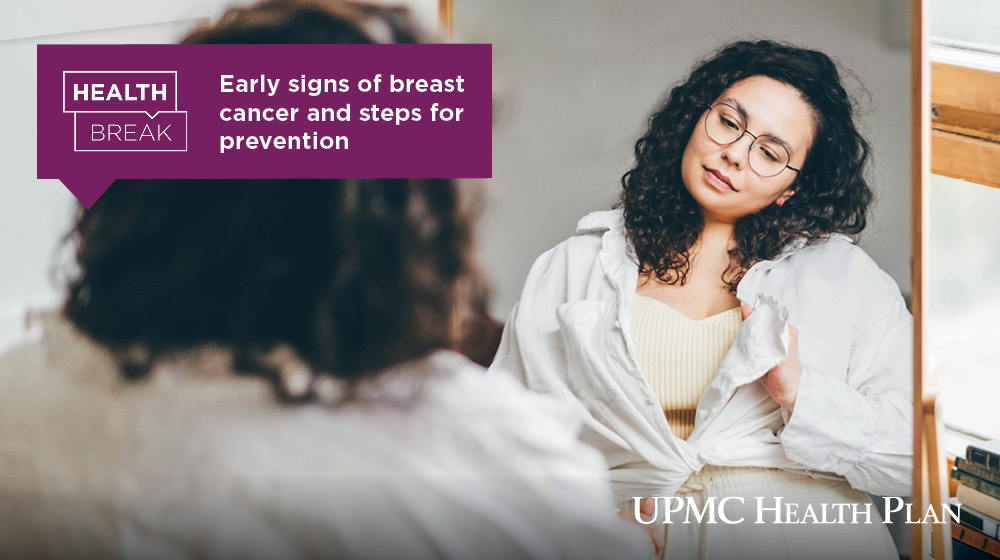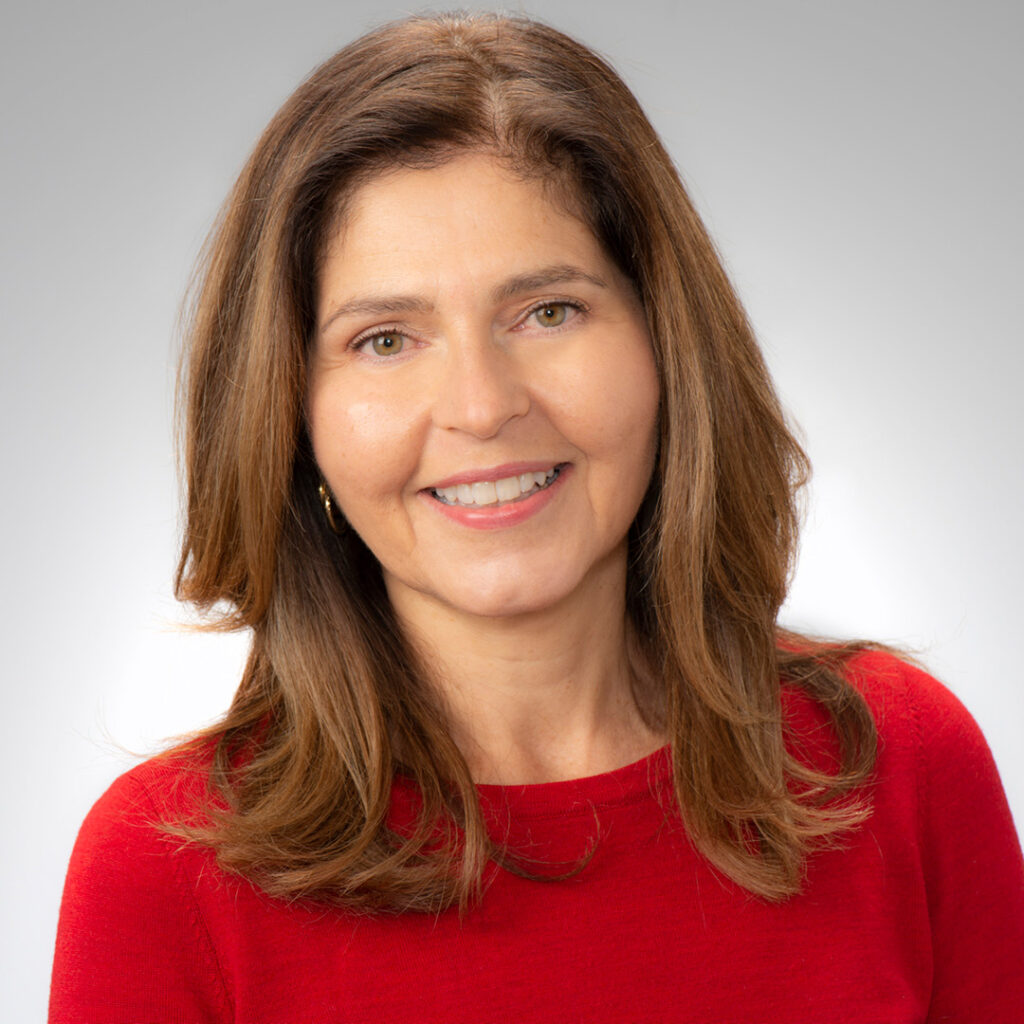Health Break: Early signs of breast cancer and steps for prevention

A podcast for UPMC Health Plan members, Health Break is your quick guide to caring for your mental and physical health, prioritizing wellness, and making the most of your health insurance plan.
Episode 35: Take a Health Break with Dr. Margarita Zuley
Dr. Zuley takes a Health Break to talk about breast health and share steps to take for breast cancer prevention.
Episode transcript:
Camille: Welcome to Health Break by UPMC Health Plan, your quick guide to health, wellness, and how to make the most of your health insurance plan. I’m your host, Dr. Camille Clarke-Smith. I help to oversee the quality of the plans and programs we offer at UPMC Health Plan.
Angelo: And I’m your co-host, Angelo Bartic. I’m a health coach who works with our members on making healthy lifestyle habits and setting goals. This is your…Health Break.
Camille: Hey everyone, Dr. Camille Clarke-Smith here, and today we’re talking with Dr. Margarita Zuley about breast health and breast cancer prevention. Thank you, Dr. Zuley, for being here with us on today’s UPMC Health Plan Health Break.
Dr. Zuley: Thank you for having me.
Camille: First question, how does breast cancer grow or develop and how common is it?
Dr. Zuley: Breast cancer starts in the breast as an abnormal cell, and then that cell begins to multiply and grow, which is pretty much how every cancer in the body starts. It is the most common cancer that women get globally, and it is the second leading cause of death from cancer globally. But there’s really good news, because when found early survival rates are above 95 percent. Most women diagnosed with breast cancer have no family history or other risk other than being a woman. And their risk goes up as they age.
Camille: What are some early signs or symptoms that we may see?
Dr. Zuley: Well, most women who have breast cancer detected on screening mammogram have no symptom at all. We’d pick it up in the preclinical phase, which means before symptoms arise, which is why prognosis is so good. However, some women can still identify cancer clinically, and some of the more common ways that they’ll find it is that they could feel a lump in their breast. They may notice that their breast is different in size, either shrinking or feeling bigger. The skin may be thick or be retracted towards a mass in their breast. They may notice changes in their nipple or notice discharge from their nipple, most commonly bloody or clear like water.
Camille: Can people who are assigned male at birth also develop breast cancer?
Dr. Zuley: They can. There’s a few ways. First is they could have a propensity to develop breast cancer because of their family history. So they may have a gene mutation. One of the breast cancer genes are so-called BRCA genes that runs in their family that could increase their risk of breast cancer. But also persons who are assigned male at birth and receiving hormonal therapy for female reassignment should also undergo screening mammograms yearly, beginning at age 40, and should watch for clinical signs of breast cancer, just like persons assigned female at birth.
Camille: I’ll make sure my mom gets hers and put it on my calendar to make sure I get it when I turn 40 in about two years. Can you tell us about steps to take for prevention?
Dr. Zuley: So the most important preventative step is to get your screening mammogram starting at 40 because one in eight women develop breast cancer over their lifetime. When you look at it at a population level, and most of the women that we screen have no symptoms. So that’s the single most important thing that I could say. The mammograms that we do at UPMC are an advanced kind of mammogram called a 3D mammogram or a tomosynthesis. They find more cancers than regular mammography. The exam takes about 10 minutes of time, and I’ll tell you, there’s a few reasons that women don’t come. The first is that it hurts or they’re afraid that it’s going to hurt, or they might have had a bad experience or someone that they know had a bad experience. And so there’s fear with this test. So the most important thing I could say is that we’re there for you. We’re there to partner with you. We want you to come in and if you have any fear or concern, please share it with us and we’ll help you through this because every patient is in control of every medical test that they get.
The other thing that we’re really working on in our program is really thinking about every patient individually. Patients come to us with unique risks, and we want to make sure that we provide the absolute best care that we can to every woman. And so we’ve begun to offer supplemental screening MRI for women at elevated risk. I would suggest for any woman who wants more information on that to speak with their physician, and/or we would be very happy to speak with anybody as well.
Camille: Thank you, Dr. Zuley, for sharing all this information. Some information that I didn’t even know that the plan has!
Dr. Zuley: Thank you for having me.
Camille: Be sure to schedule your breast cancer screening. Call the number on the back of your ID card to get connected to our Member Services team, who can help you set up an appointment.
Find show notes and more information at upmchealthplan.com/podcast. Join us as we continue exploring health, wellness, and how to make the most of your health insurance plan in the next episode of Health Break.
This podcast is for informational and educational purposes. It is not medical care or advice. Individuals in need of medical care should consult their personal care provider. Views and opinions expressed by the hosts and guests are solely their own and do not necessarily reflect those of UPMC Health Plan and its employees.
Related to this episode:
- Learn more about breast cancer screenings.
- To schedule your mammogram:
- Call 1-877-851-5577 (TTY: 711) to schedule your breast cancer screening today. Health Care Concierges are available Monday through Friday from 8 a.m. to 6 p.m. and Saturday from 8 a.m. to 12 p.m.
- Find a location near you with special member-only hours and dates. Our team will help set up your appointment!
- Find participating providers using our provider search tool.
About Dr. Margarita Zuley:
Dr. Zuley is a Professor of Radiology and Vice Chair of Quality Assurance and Strategic Development, Department of Radiology at UPMC, and Chief of Breast Imaging of UPMC. Dr. Zuley has 52 scientific publications in peer-reviewed journals and is a past president of the Society of Breast Imaging, among other positions. Her current active areas of research include new technology evaluation including digital breast tomosynthesis, contrast-enhanced mammography, and linkage of national registries for cancer outcomes.
About Dr. Camille Clarke-Smith:

Camille Clarke-Smith, EdD, is a program director in the Quality Improvement, Medicare Stars Department at UPMC Health Plan, where she leads the Medicare Faith and Wellness Program, a 3- to 12-week health and wellness challenge. She is also the founder of the nonprofit Transforming the Health of African American Women (THAW) Inc. She earned a doctorate in health and physical activity education from the University of Pittsburgh in addition to a master’s in exercise science and a bachelor’s in psychology and sociology. She is currently pursuing her master’s degree in social work at Carlow University.




